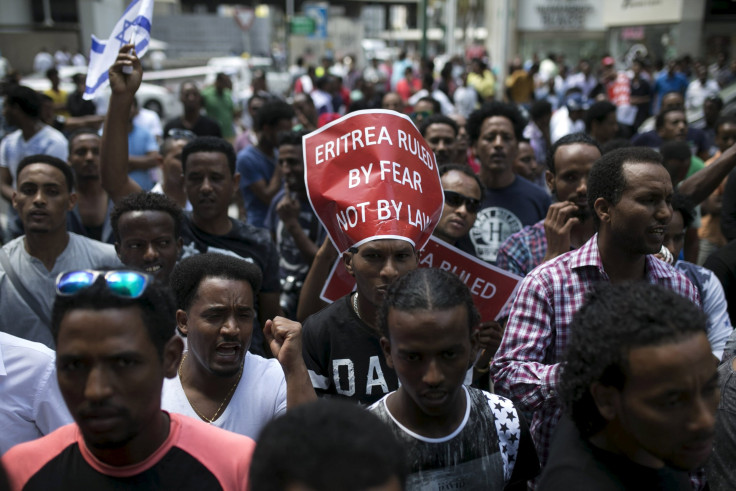Eritreans In Israel Protest For Refugee Protection

Hundreds of Eritreans, angered by what they said was Israel’s failure to protect asylum seekers, took to the streets of Tel Aviv Thursday to rally for recognition as refugees. The protest came just weeks after the United Nations released a damning report on Eritrea’s human rights situation, detailing “systemic, widespread and gross human rights violations” in the Horn of Africa country.
Thursday’s demonstration took place outside the headquarters of the European Union delegation in Tel Aviv, Agence France-Presse reported. Organizers of the rally aimed to draw attention to the human rights abuses highlighted in the U.N.’s report, and to push for Israel and European countries to accept Eritreans as refugees as EU leaders continue to grapple with a massive migrant influx. Eritreans make up the second-largest group of migrants, after Syrians, making perilous journeys across the Mediterranean Sea toward refuge in European countries.
The U.N. issued its 500-page report on human rights in Eritrea on June 8, citing a widespread culture of fear under the government of President Isaias Afwerki, who has been in power since 1993, when the country gained independence from Ethiopia. Arbitrary detentions, torture against dissenters, potentially indefinite and forced military conscription, alongside a sweeping mass surveillance system, have propelled around 5,000 Eritreans out of the country each month, the report said. Eritrea’s government forcefully denied the allegations.
Israeli officials have regularly referred to Eritreans and Sudanese migrants as “infiltrators” and as economic migrants, which aren’t eligible for asylum. At Thursday’s protest, demonstrators railed against the assumption that Eritrean migrants were only seeking economic opportunity. “Eritreans don’t flee their home and their country because they want a better job, or a car, or a plasma TV,” read a statement from the protest organizers, according to Agence France-Presse. “We flee our homes because we are born to be free and live in dignity and safety.”
Israel is home to an estimated 42,000 Eritrean and Sudanese nationals, and Israeli authorities have taken a hard line on immigration in recent years. Last year a Human Rights Watch report found that Israel routinely denied asylum seekers access to due process and “unlawfully coerced” around 7,000 Eritrean and Sudanese immigrants into leaving the country and risking abuse at home. Israeli officials have disputed the report, saying they offer migrants a choice, not an order, to repatriate.
Thousands of Eritrean and Sudanese migrants are held in Israel’s Holot detention center. That includes migrants petitioning for asylum. Originally, the Holot center was allowed to hold immigrants indefinitely, but a court ruling in September limited the maximum detention period to 20 months.
© Copyright IBTimes 2024. All rights reserved.






















